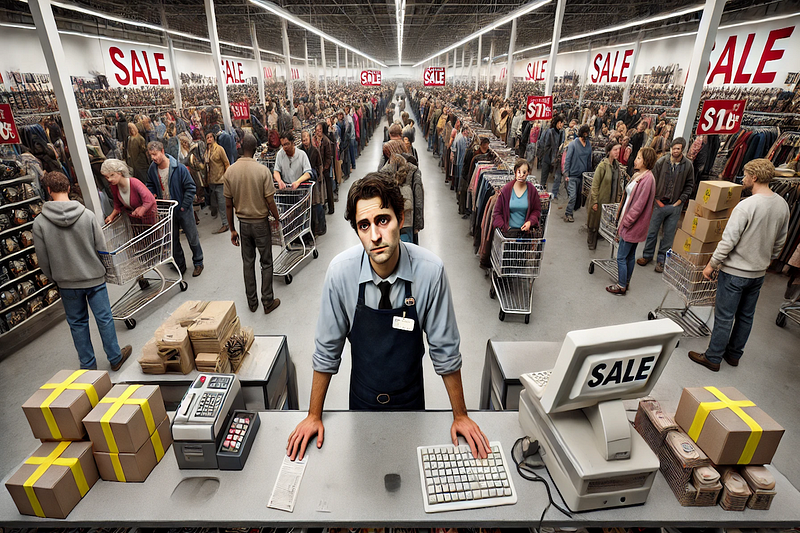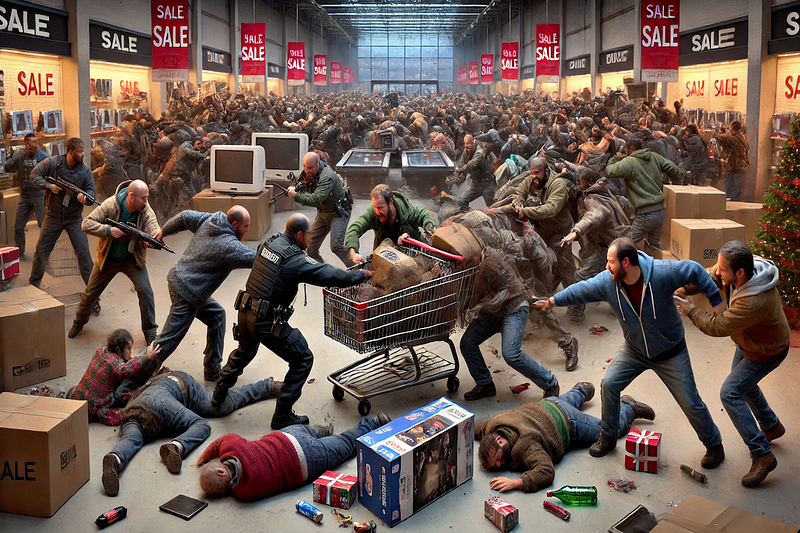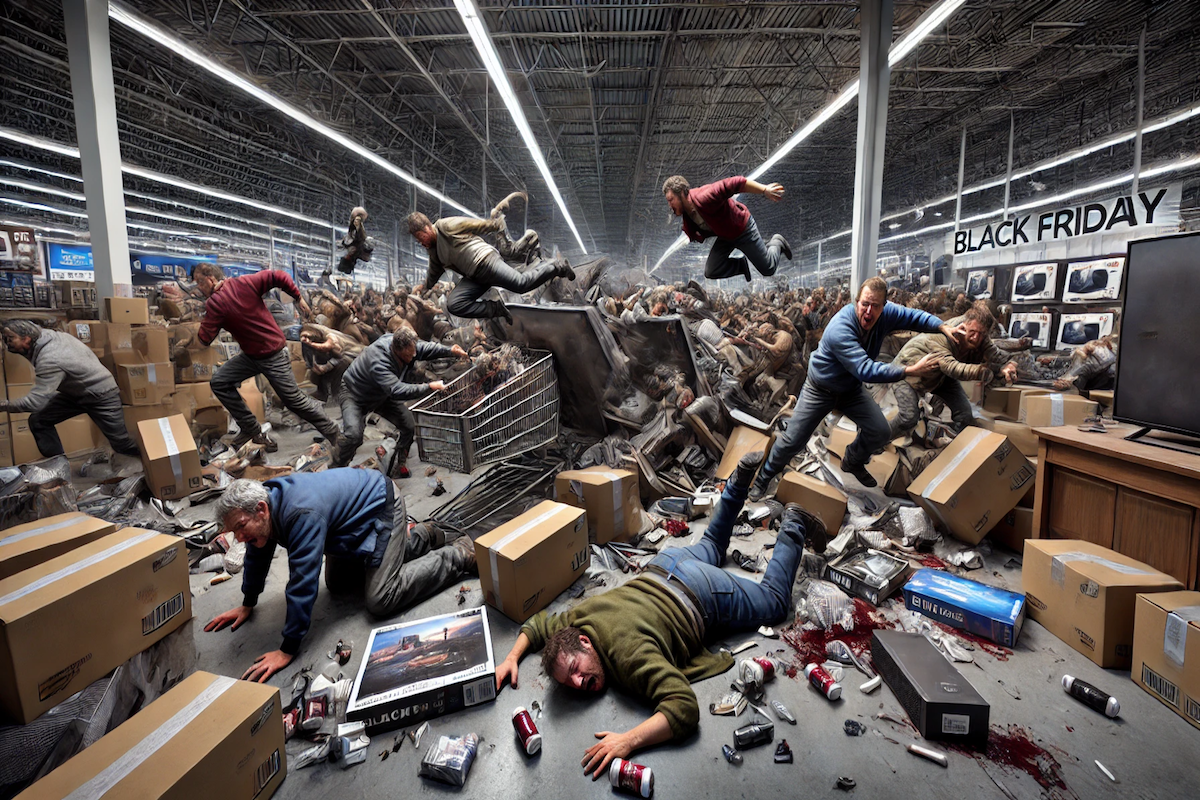Contents
- From Gratitude to Greed: How Black Friday Stole the Spotlight After Thanksgiving
- 1. Deals So Good, They’ll Haunt Your Conscience
- 2. Exporting the Madness: Black Friday Goes Global
- 3. The Real Price of Black Friday: Retail Workers in the Crossfire
- 4. Brawls, Stampedes, and Pepper Spray: When Shopping Gets Savage
- 5. How Black Friday Crushes Small Businesses
- 6. Black Friday FOMO: The Anxiety Olympics
- The Simple Solution: Opt-Out and Reclaim Your Day
- From Chaos to Calm: The Choice Is Yours
From Gratitude to Greed: How Black Friday Stole the Spotlight After Thanksgiving
Ah, Thanksgiving, the day that represents the very best of the good ol’ USA! The day we bask in gratitude, family love, and a second helping of mashed potatoes.
But as the clock strikes midnight, this wholesome Normal Rockwell painting gives way to the day that represents the very worst of America.
It’s the USA’s most unhinged tradition: Black Friday!
It’s not just shopping, it’s a full-contact sport where civility is traded for doorbusters and the concept of “peace on Earth” gets trampled along with store employees.
Yet this consumerist circus has transcended U.S. borders, becoming a global phenomenon of greed, chaos, and environmental destruction.
If you thought Black Friday was bad in America, buckle up.
Around the world, it’s exported with the very worst of American culture along with fast food chains and reality TV.
All wrapped nicely in a shiny bow, and gifted to the unsuspecting masses.
1. Deals So Good, They’ll Haunt Your Conscience
It starts innocently enough. Thanksgiving, a day of gratitude and love.
You’re surrounded by family, swapping stories, and debating which pie is superior (spoiler: it’s pumpkin).
But once the turkey carcass is cleared, something shifts.
The TV flickers on, and ads start shouting promises of happiness wrapped in shrink wrap. “Get it now before it’s gone!” the screen screams, as if a 40-inch TV for $150 will solve all of life’s problems.
I still remember the first time I ventured out into the madness. The adrenaline, the crowds, the pure insanity of it all.
Someone snatched a juicer out of my cart while I was looking the other way. I thought about fighting back, until I saw the look in their eyes.
These weren’t just shoppers, they were gladiators.
It’s the kind of chaos that would make the “Hunger Games” blush.
But this isn’t just about snagging a deal, it’s about the adrenaline rush of winning. Because in America, even shopping is a competition.
Worse, this frenzy isn’t just America’s problem anymore.
Black Friday has gone global, skipping the gratitude of Thanksgiving and diving straight into consumer chaos.
2. Exporting the Madness: Black Friday Goes Global
What started as an American quirk has gone global. Black Friday has been embraced everywhere from London to São Paulo, often replacing local traditions with a shopping frenzy.
The U.K. turned Black Friday into one of its biggest retail days, while Brazil had to navigate early scandals of “fake deals” before the event became a trusted part of its shopping calendar.
In countries like South Africa, where income inequality mirrors the U.S., Black Friday adds another layer of complexity.
It creates a divide where those who can afford to splurge celebrate, while others go into debt chasing deals.
And unlike America, many countries don’t have Thanksgiving to balance out the greed with gratitude.
Stay tuned, because we’re about to dive into the heartbreaking stories of retail workers and why skipping Black Friday could be the ultimate act of rebellion.

3. The Real Price of Black Friday: Retail Workers in the Crossfire
For every discounted air fryer and flat-screen TV wrestled over, there’s a retail worker paying the price.
These unsung heroes of consumerism endure grueling shifts that often start on Thanksgiving itself, robbing them of precious family time.
Armed with caffeine and forced smiles, they face hordes of impatient, aggressive shoppers who seem to forget the concept of basic decency.
Remember that $5 toaster?
Behind it is a worker who has been shouted at, shoved, and perhaps even reduced to tears by the frenzy.
Retail employees are the hidden cost of Black Friday, often underpaid, overworked, and left to clean up the chaos.
It’s an exploitation cycle that raises uncomfortable questions: are those deals really worth someone else’s dignity?
If you thought the in-store chaos was bad, wait until you hear about the fights spilling out into parking lots.
Stick around, things are about to get even messier.

4. Brawls, Stampedes, and Pepper Spray: When Shopping Gets Savage
Black Friday has a well-earned reputation as a contact sport. Year after year, it delivers a jaw-dropping reel of human behavior at its absolute worst.
Take the Walmart employee who was trampled to death in 2008 by an impatient crowd, or the 2011 incident where a woman pepper-sprayed fellow shoppers in Los Angeles to snag an Xbox.
Parking lots are no better. In 2018, a heated argument over a parking space in Alabama escalated to gunfire, leaving one man dead.
Inside the stores, brawls over flatscreens and discounted toys have become so common they’re almost expected.
In one particularly absurd incident, shoppers in Arkansas stampeded over Tupperware.
Yes, plastic containers, like it was the holy grail of kitchenware.
These incidents are more than just viral moments, they’re symptoms of a deeper issue.
Black Friday encourages a mentality of scarcity and competition, where grabbing the deal is more important than basic decency.
But as this madness spreads across borders, it’s also squeezing out small businesses worldwide.
5. How Black Friday Crushes Small Businesses
While mega-retailers like Amazon and Walmart rake in billions, local shops struggle to compete.
Black Friday’s emphasis on volume and rock-bottom pricing is a game small businesses simply can’t win. The result?
Community-driven stores are left out in the cold, unable to match the deep discounts of corporate giants.
This isn’t just bad news for your neighborhood bookstore or boutique; it’s a blow to diversity and local economies.
As big-box stores dominate, retail landscapes around the globe become increasingly homogenized.
The more we funnel our dollars into these corporate behemoths, the fewer choices we’ll have down the road.
Think that’s bad? Just wait until we unpack the toll Black Friday takes on mental health.
6. Black Friday FOMO: The Anxiety Olympics
If Black Friday is a competition, then FOMO (Fear of Missing Out) is the fuel that drives it.
Retailers know exactly how to stoke this anxiety: flashing countdown clocks, “limited time offers,” and ads that scream, “Act fast before it’s gone!” The result?
Shoppers experience a rollercoaster of adrenaline, stress, and, ultimately, regret.
Impulse buys often lead to buyer’s remorse, while the pressure to snag deals can create a toxic mix of anxiety and exhaustion.
And it doesn’t stop after checkout.
Studies show that many shoppers feel regret or even depression post-Black Friday, realizing they’ve spent money on things they didn’t really need.
But what if I told you there’s a way to opt out of this madness entirely?
Stick with me, the solution is simpler than you think.

The Simple Solution: Opt-Out and Reclaim Your Day
What if, instead of participating in Black Friday, you declared it a No Shopping, No Spending Day?
Instead of battling crowds or clicking “add to cart,” spend the day connecting with family, enjoying leftovers, or simply taking a well-earned rest.
Many traditions already set aside days for reflection and non-commerce.
For example, in Judaism, the Sabbath (Shabbat) is a weekly pause from buying and selling, focusing instead on rest, gratitude, and spirituality.
By choosing to opt out, you’re not just saving money, you’re making a statement.
A day without shopping is a day free of the chaos, the exploitation, and the environmental toll.
It’s a chance to reflect on what really matters during the holiday season.
From Chaos to Calm: The Choice Is Yours
Black Friday is a paradox wrapped in plastic: a day of greed and anxiety overshadowing a holiday of gratitude and connection.
It’s America’s contradictions on full display, and now, it’s the world’s problem too. But it doesn’t have to be.
Skip the deals. Stay home. Reclaim your peace. Declare Black Friday a personal “Buy Nothing Day” and savor the quiet satisfaction of not wrestling anyone for a blender.

David Peluchette is a Premium Ghostwriter/Travel and Tech Enthusiast. When David isn’t writing he enjoys traveling, learning new languages, fitness, hiking and going on long walks (did the 550 mile Camino de Santiago, not once but twice!), cooking, eating, reading and building niche websites with WordPress.

